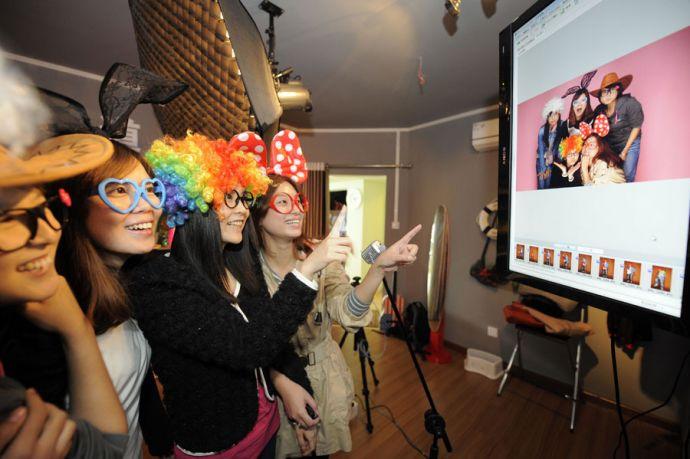
BEIJING -- Still camera-or cameraman-shy in the age of selfies? Or, selfie-obsessed but have no professional photography skills? Bored of plain-vanilla selfies, so crave special effects? Or, want to start a photography business but don't have image software skills and hardware? Whatever be the case, there's a new business-selfie studios-just for you.
It's "lights, camera and action" of a different kind. Walk in, close the door, wave your hands to automatically switch on the movement-sensitive technology in the studio. The PC monitor (with a camera fitted on its top), the lights, and other stuff come alive.
No one would know about your poses in front of the camera unless you share them. You can select special effects on the monitor after the shoot. In a jiffy, you can pick up the prints from the self-operated counter, or copy the images into your USB storage.
Youngsters, newly married couples and young parents are suitably smitten. And the recently mushroomed selfie studios at malls, railways stations and shopping plazas, operated by new business chains, startups and franchises across China, are eager to meet the demand.
Relatively small and new, selfie studios constitute a still-evolving or not-yet-mainstream business. So, hard data is yet to be compiled. Studio services are charged by the hour. Typically, an hour in a studio could cost a consumer 120 yuan ($19).
"Our business is akin to KTV," said Chen Nan, marketing manager of Oak Selfie Studio in Beijing, a unit of Wuhan Zhongguokeji Co Ltd, an image-related software technology startup.
"It doesn't require much to set up a selfie studio. You only need a camera with a tripod, a virtual background and software to process images. What a selfies studio does is to make the photography business more accessible to ordinary people who may lack professional training."
Oak also offers the startup pack for those who want to set up a selfie studio. The pack is priced 16,000 yuan upward and includes camera and software.
Chen and his partners founded Oak in 2014 during their university days. They boast hundreds of franchises across the country.
Their startup packs have proved to be quite a hit in Singapore and the United Kingdom, and services are popular among girls and couples, Chen said.
Many people want to have pictures taken but are camera-shy. "It's best to leave them alone in a room and let them fly," he said,
"We have a successful case in Hong Kong that does wedding services, and we are trying to promote the idea to parents with babies because the chances of parents taking their baby for photos are higher than that for others."
Studios are not the only businesses trying to exploit Chinese youngsters' selfie craze. There are selfie-oriented apps, mobile phones with specially designed front cameras and digital cameras with selfie function. The market has even coined a term-"the selfie economy"-to describe this business.
"The selfie economy has been powerful enough to change various industries, and it has largely reshaped the sub-culture among the youngsters," said Gao Liming, a researcher at the Shanghai Institute of Finance and Law, in a column for Southern Weekend.
"For example, it is powerful enough to change the cosmetics industry and force them to make more water-based makeup products instead of oil-based ones for young ladies. The young females love to take selfies in the morning when their makeup is fresh and oil-based cosmetics would ruin a perfect selfie by making them look oily." (source: China Daily)




 A single purchase
A single purchase









